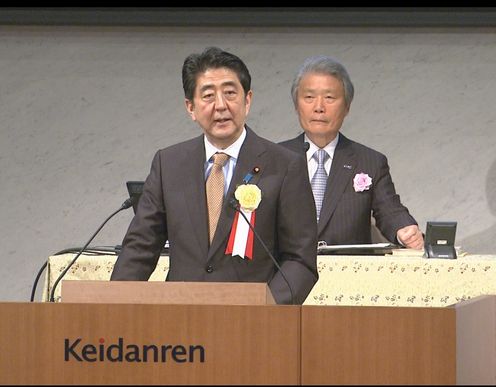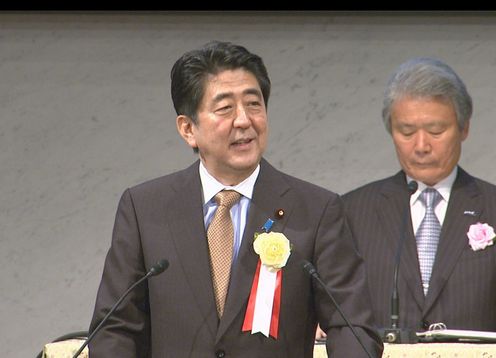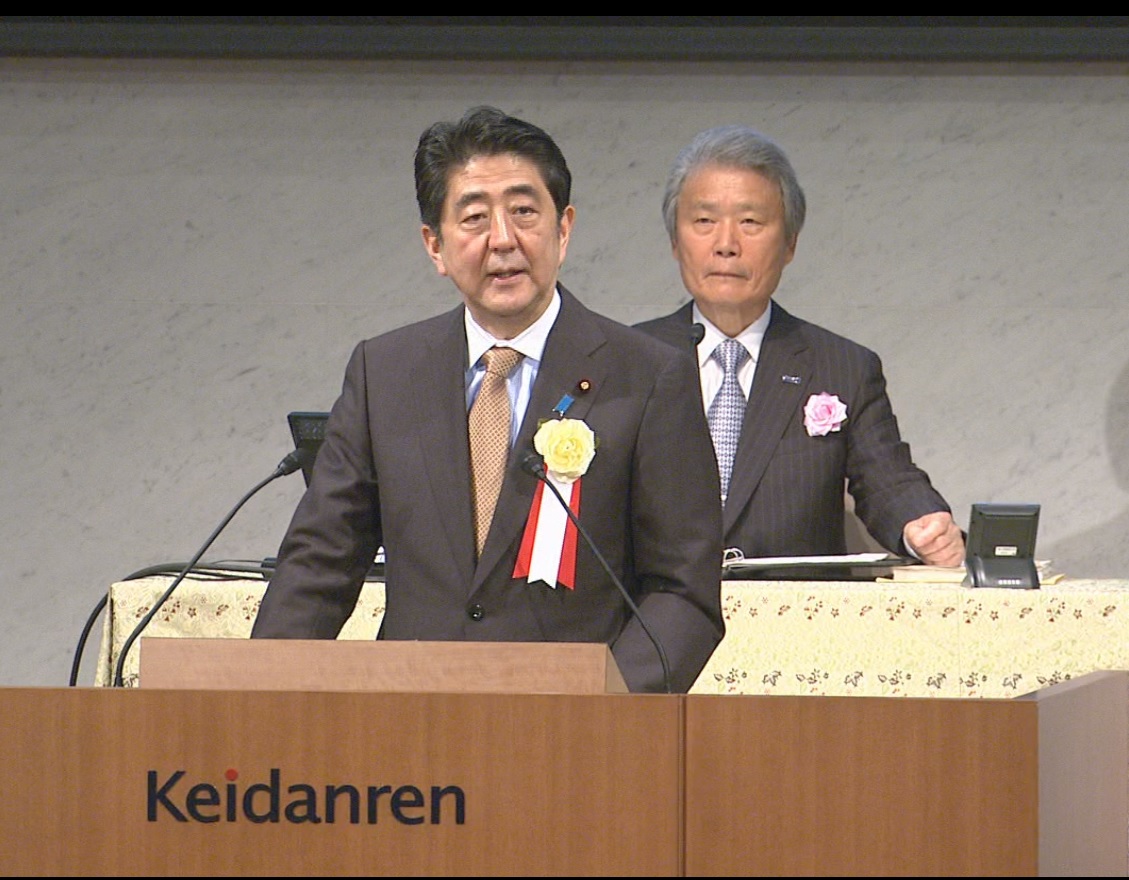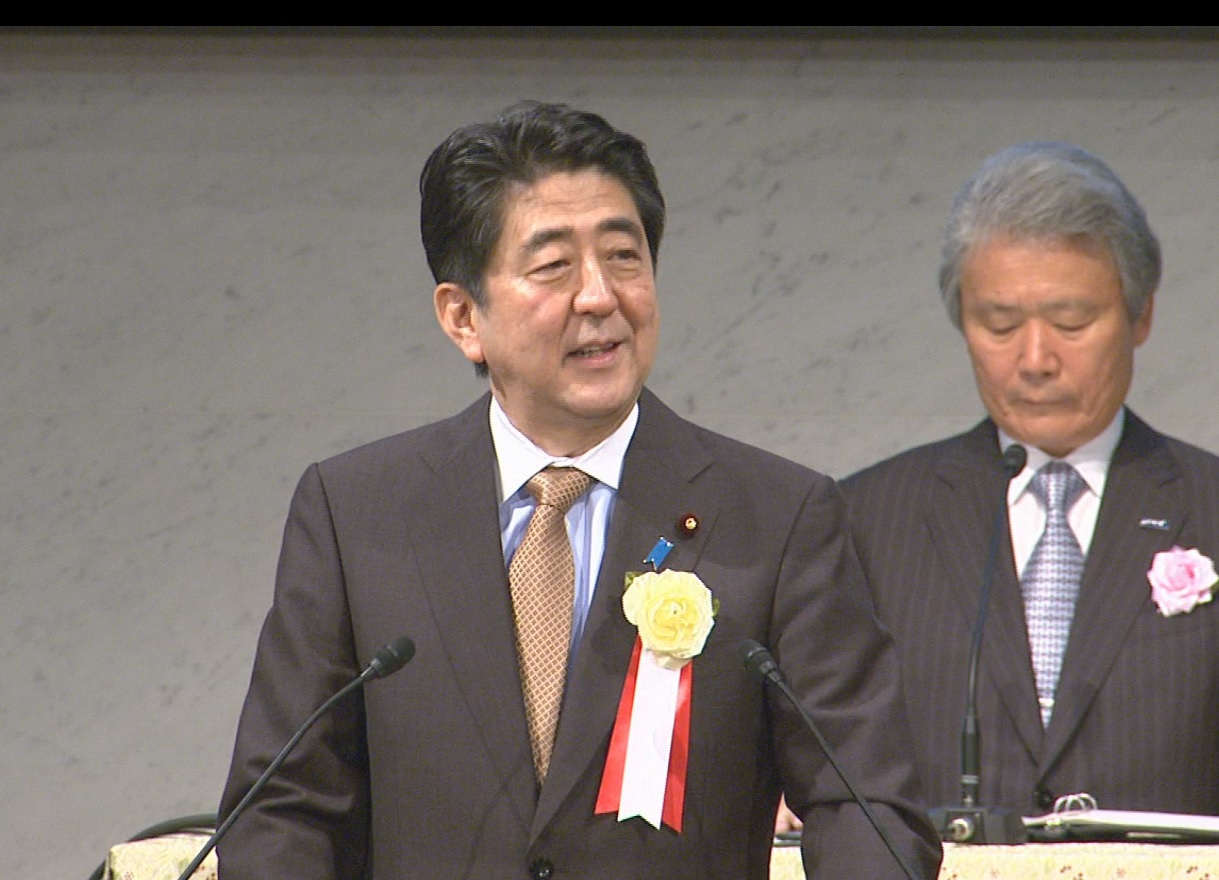Home > News > The Prime Minister in Action > June 2015 > Regular General Meeting of the Nippon Keidanren
The Prime Minister in Action
Regular General Meeting of the Nippon Keidanren
June 2, 2015

Photograph of the Prime Minister delivering an address (1)

Photograph of the Prime Minister delivering an address (2)
[Provisional Translation]
Prime Minister Shinzo Abe attended the Regular General Meeting of the Nippon Keidanren held in Tokyo.
In his address, the Prime Minister said,
“Thank you very much for inviting me here today.
All of the members of the Keidanren lead the business community and are working as one to accelerate Japan’s economic revitalization. In particular, in the year since his appointment Chairman Sakakibara has demonstrated bold resolve in the Council on Economic and Fiscal Policy and the Government-Labor-Management Meetings in supporting the Government’s measures. I would like to again express my profound gratitude.
This year marks the landmark 70th anniversary of the end of World War II, and will also be a year to carry out reforms. In carrying out the most drastic reforms since the end of World War II, the Abe Cabinet will place the utmost priority on actual implementation. In this regular Diet session, we have submitted bills to strongly advance reforms in areas with vested interests such as agriculture, medicine, energy, and employment. Heated discussions are about to start in earnest. We will exert all our efforts to get the bills passed. We will not go back on the reforms, or water them down in any way.
National borders have disappeared from economic activities. If Japan cannot win against the international competition, we cannot survive. By boldly advancing domestic structural reforms, we will raise Japan’s international competitiveness. At the same time, through economic partnerships, Japan can expand its sphere of economic activity. The key to my growth strategy is unified domestic and international reform. The TPP negotiations are at the final stage. We have at last begun to see the exit.
When I visited the United Sates recently, I was able to confirm with President Obama that Japan and the United States will lead the overall negotiations towards achieving their early resolution. And last week, at the Japan-EU Summit Meeting, we agreed to accelerate negotiations so as to reach an agreement on a Japan-EU EPA by the end of the year. I will take on the challenge of implementing drastic reforms that will, in one fell swoop, eliminate all barriers hindering the movement of people, goods, and funds between Japan, and the two major economic spheres of the United States and the EU.
The three arrows of Abenomics, to which we have devoted our full efforts ever since the inauguration of our administration, are steadily producing results. Corporate operating income levels are at an all-time high, the ratio of job offers to job seekers is at the highest level in 23 years, and the number of people employed has increased by 900,000. This year is truly critical to our efforts to accelerate this positive economic cycle that has begun to form and ensure that the winds of economic recovery are fully felt throughout Japan.
Above all, the key to establishing and expanding the positive economic cycle is raising wages. In this year’s spring wage offensive, you all gave extremely positive answers. Wage increases this year are expected to be higher than last year’s. Moreover, in order to further advance efforts to establish an environment conducive to raising wages in small- and medium-sized enterprises, the members of the Keidanren have also worked hard to carry out measures to pass on price increases. I am deeply grateful for your courageous resolve.
When I visited the Keidanren for the first time as Prime Minister, all I did was make requests. Today, however, all I wish to do is offer my thanks.
If wages continue to rise, consumption can be expected to recover. However, an improvement in consumption alone does not result in a sustainable positive economic cycle. In April, the unemployment rate had improved to 3.3 percent, a figure not seen for 18 years. This is a welcome result. However, at the same time, some believe that we are approaching full employment. Furthermore, an increase in the population of working-age people cannot be expected for some time. Even if consumption alone expands, if productivity does not also increase, in any event growth will be limited by capacity.
Abenomics, which aims to realize a positive economic cycle, is entering a new stage. The key to improving productivity is, more than anything else, investment. That is, investment in capital, technology, and talent, aimed at future development. Amidst the deflation that has been occurring for almost 20 years, investment has been curtailed. During this time, capital in Japan’s manufacturing industry has aged by 1.5 times and deteriorated. I have been exerting all my efforts in the reforms of vested interests, corporate tax reform, economic partnerships, and the major reforms to achieve a fourth industrial revolution through the implementation of a strategy for robot revolution and the creation of a data-driven society. All of these are policies that promote private sector investment. They are not reforms merely for the sake of reform. No matter how much reforms are advanced, however, unless private sector companies implement investment, reform is meaningless. In Japan, where the market is mature compared to other Asian countries, we do not anticipate the type of simple ‘increased capacity investment’ that characterized Japan’s rapid growth period.
What we need for a positive economic cycle is investment that introduces new technology and business models that increase productivity to existing capital.
When I visited the Hokuriku region recently, I toured a Komatsu factory. As well as completely rebuilding the previously existing factory, Komatsu has installed the latest energy-saving devices and production equipment, while also using renewable energy. This bold investment resulted in a 90 percent drop in the amount of energy purchased and a 20 percent increase in productivity. The profits of Japanese companies are on an unprecedented scale. An environment has now been established in which companies can shift gears and apply aggressive management. However, although investment in the private sector has at last started to actually move, this cannot necessarily be described as bold. ‘We may also return to a high yen.’ I have also heard the views of some business operators who are concerned about a possible negative reaction after the Tokyo Olympics. However, there is no investment without risk, as you all well know. Since the change in government, investment into Japan from overseas has increased by more than tenfold. For example, Apple has decided to build a large-scale research base in Yokohama. Surely it is about time that we put an end to the deflationary mindset that has held sway for almost 20 years, and instead embark on bold investment. The main players on this new stage are investments carried out by your private sector companies. My very message to you is, ‘There is no better time than now!’ I hope you will make bold decisions.
One other key to improved productivity is the service industry, which accounts for 70 percent of both GDP and employment. Improvement in the productivity of the service industry, which has low productivity both compared to the manufacturing industry, and compared to various other countries, is absolutely essential for overcoming Japan’s overall labor supply constraints. I would like to express my gratitude to Chairman Sakakibara for the decision at the April Government-Labor-Management Meeting that the Keidanren will support such moves and work as a whole to carry out the relevant measures. I would like the public and private sectors to work as one and exert strenuous efforts to improve the productivity of the service industry.
Realizing a society where women shine is also a trump card for the growth of Japan, a country with a diminishing population. Recently I heard the views of some female entrepreneurs based in Kobe City. They offer new services, new work styles, and an enterprising spirit. I really felt that women will create a new Kobe. I would definitely like to pass the bill that I have submitted to this Diet session on promoting women’s active role. When I spoke to the Keidanren three years ago, I commented that, although the Liberal Democratic Party is a male-dominated organization, that is even truer in the case of the Keidanren, with hardly any women attending the event. This time, however, I am pleased to see some women in attendance here and there, showing their powerful presence. I would like to request that the Keidanren devote more effort than ever before to fostering and furthering the careers of women.
At the start of this year, I received a proposal from the Keidanren with your vision for Japan in 2030. Its direction is the same as the one aimed for by the Abe Cabinet. Precisely because we are now experiencing a difficult era that is undergoing dramatic changes, we must focus on the future, depict the appropriate development we would like to achieve, and share it. Then, we will face up to difficult issues, tackle them, and implement solutions. It is that very ability to act, and that very courage, that will create Japan. This is what I believe.
Let us act boldly and in a forward-thinking manner, and pool our strengths to jointly pave the way for Japan’s future. To that end, investment is essential. With those words, I would like to conclude my remarks today. Thank you very much.”


